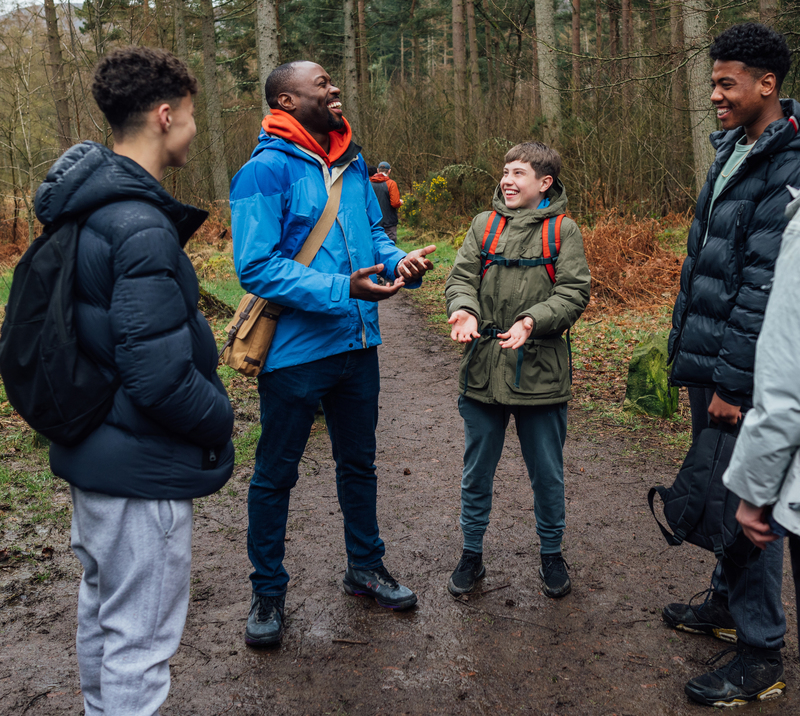{{ root_page.title }}
Care services

"The most useful part for me has been how closely the course is linked to my everyday work. As a playworker at a primary School, I have been able to apply what I learn directly in my daily role."
- Drillona Xhaferi - Playworker Apprentice - Grand Avenue Primary School
So, you want to know more about becoming a...
Level 2 Playworker
What does a playworker do?
This occupation is found in a range of play settings offering different models of Playwork. Most Playworkers are employed in the voluntary or public sector, while others work in the private sector. Playworkers may work in local community settings, such as Before and After School Clubs, Adventure Playgrounds and Mobile Play Provision, for example a Playbus.
What does their day-to-day role look like?
In their daily work, an employee in this occupation interacts with:
- Children and young people and families from a range of backgrounds
- Team members
- Healthcare Professionals
- Police and other members of the Emergency Services
- Child Adolescent Mental Health Services (CAMHS)
- Social Services
- Youth and Community Workers
- Representatives from the relevant Local Authorities
- Local residents
- Park Wardens
Career progression
Engagement worker, Inclusion/support playworker, Play ranger, Playground assistant, Playworker
Duration of apprenticeship
18-20 months. However, there are accelerated apprenticeship options available based on the credentials of apprentices meaning that the apprenticeship can be completed in a shorter period of time.
Qualifications needed prior to completion of apprenticeship
As of February 2025, the government announced that apprentices who are aged 19+ at the start of their apprenticeship training no longer require maths and English as part of apprenticeship completion rules. This applies to all learners currently on an apprenticeship as well as new apprenticeship starters.
Some employers will still require applicants to already have English and maths qualifications prior to starting apprenticeships or during them however for other employers this will no longer be a requirement for their apprenticeships so please make sure to read the English and maths requirements for apprenticeships when you complete your application.
End Point Assessment (EPA)
When your training is complete we will make the decision, along with your employer, to put you forward to your End Point Assessment (EPA). This is the final process in your apprenticeship, it is an assessment of the knowledge, skills and behaviours that you would have learnt throughout the apprenticeship
This will involve an Independent Assessor carrying out the following:
- Observation
- Multiple choice test
- Professional discussion (with Portfolio of Evidence included)
Your employer, your Assessor and the W2W team will support you through the EPA. For more information about the process, you can contact the W2W team at [email protected]
When you have successfully completed your apprenticeship and passed your EPA, you will be awarded a certificate.


Level 3 Youth Support Worker
What does a youth support worker do?
This occupation is found in informal settings such as youth clubs, activity-based projects and social action projects; or more formal settings such as schools, Early Help or youth offending and in local authority, charity, private or voluntary organisations. Youth support workers may work in more specialist settings such as schools, alternative education provisions, hospitals, youth justice environments or within the social care system.
What does their day-to-day role look like?
In their daily work, an employee in this occupation interacts with a wide range of organisations working with young people such as schools, justice organisations and community organisations. They may work with a range of professionals including youth workers, teachers, social workers, police, youth offending officers, local government officials and health professionals. As a youth support worker they may be working inside in specific environments like youth centres, hospitals, community based projects or schools, youth support workers often work unsociable hours, including evenings and weekends and sometimes outside in all weathers undertaking detached or outreach work.
Career progression
Deputy leader, Part-time youth leader, Participation worker, Project worker, Youth club leader, Youth development officer, Youth support worker.
Duration of apprenticeship
18 months. However, there are accelerated apprenticeship options available based on the credentials of apprentices meaning that the apprenticeship can be completed in a shorter period of time.
Qualifications needed prior to completion of apprenticeship
As of February 2025, the government announced that apprentices who are aged 19+ at the start of their apprenticeship training no longer require maths and English as part of apprenticeship completion rules. This applies to all learners currently on an apprenticeship as well as new apprenticeship starters.
Some employers will still require applicants to already have English and maths qualifications prior to starting apprenticeships or during them however for other employers this will no longer be a requirement for their apprenticeships so please make sure to read the English and maths requirements for apprenticeships when you complete your application.
End Point Assessment (EPA)
When your training is complete we will make the decision, along with your employer, to put you forward to your End Point Assessment (EPA). This is the final process in your apprenticeship, it is an assessment of the knowledge, skills and behaviours that you would have learnt throughout the apprenticeship
This will involve an Independent Assessor carrying out the following:
- Observation with questions
- Professional discussion (with Portfolio of Evidence included)
Your employer, your Assessor and the W2W team will support you through the EPA. For more information about the process, you can contact the W2W team at [email protected]
When you have successfully completed your apprenticeship and passed your EPA, you will be awarded a certificate.
Level 3 Safeguarding Support Officer
What does a safeguarding support officer do?
This occupation is found in a range of public, private, and voluntary sector organisations to support statutory safeguarding responsibilities to be fulfilled and demonstrate how organisations work to protect an individual’s health, wellbeing and human rights; enabling individuals to live free from harm, abuse and neglect.
What does their day-to-day role look like?
In their daily work, an employee in this occupation interacts with staff and volunteers in their organisation, service users and members of the public as the first point of contact for raising safeguarding concerns. Safeguarding support officers will also interact externally with investigative statutory agencies. A safeguarding support officer will report into the designated lead for safeguarding within their organisation.
Career progression
Safeguarding advisor, safeguarding assistant, safeguarding coordinator.
Duration of apprenticeship
The length of the training for this apprenticeship is typically 18 months. The EPA period is typically 3 months. However, there are accelerated apprenticeship options available based on the credentials of apprentices meaning that the apprenticeship can be completed in a shorter period of time.
Qualifications needed prior to completion of apprenticeship
As of February 2025, the government announced that apprentices who are aged 19+ at the start of their apprenticeship training no longer require maths and English as part of apprenticeship completion rules. This applies to all learners currently on an apprenticeship as well as new apprenticeship starters.
Some employers will still require applicants to already have English and maths qualifications prior to starting apprenticeships or during them however for other employers this will no longer be a requirement for their apprenticeships so please make sure to read the English and maths requirements for apprenticeships when you complete your application.
End Point Assessment (EPA)
When your training is complete we will make the decision, along with your employer, to put you forward to your End Point Assessment (EPA). This is the final process in your apprenticeship, it is an assessment of the knowledge, skills and behaviours that you would have learnt throughout the apprenticeship
This will involve an Independent Assessor carrying out the following:
- Presentation delivered to an independent assessor
- Professional discussion (with Portfolio of Evidence included)
Your employer, your Assessor and the W2W team will support you through the EPA. For more information about the process, you can contact the W2W team at [email protected]
When you have successfully completed your apprenticeship and passed your EPA, you will be awarded a certificate.
Get in touch
Take up this opportunity and we can make this career a reality for you - join our Level 2 Playworker / Level 2 Youth Support Worker / Level 3 Safeguarding Support Officer programme today!
- View our current vacancies
- Or express your interest

